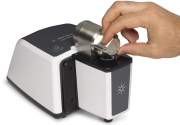By
Agilent Technologies
CobaltNiche
Designed in
Australia and USA
Description
The Cary 630 FTIR is a scientific instrument used across a wide variety of industries in the analysis of solids, liquids, and gases. It comprises of a common 'engine' component with interchangeable and patented sample modules to provide similar performance to many larger FTIR spectrometers but without the size, complexity, maintenance requirements or cost. The instrument is used for QA/QC and reseach in the chemical, pharmaceutical and food industries amongst others, as well being suited for academic and teaching labs.
Key Features
and/or Benefits
Agilent's Cary 630 FTIR is the world's smallest, and one of the most accurate spectrometers of its type. FTIR (Fourier transform infrared) spectroscopy is the leading lab-based infrared material and molecular compositions identification technique. The Cary 630 FTIR is a modular system, with a common main 'engine' component and simply interchanged sample modules (including patented DialPath / TumblIR units), allowing different uses and applications. It has similar performance to many larger FTIR spectrometers but without the size, complexity, maintenance requirements or cost. Its small footprint makes it more flexible within labs were benchspace is always at a premium.
FTIR instruments can analyse physical samples that range from solids, powders, gels, liquids and gases. These samples require specific introduction techniques. The Agilent Cary 630 FTIR uniquely caters for these applications through innovative interchangeable sampling modules. These modules all have a common slide mechanism which locks in and out of the main engine component. This positive interface requires no optical re-alignment between modules, allowing rapid and accurate reconfiguration. As well as contributing to the instrument's small overall size, this modular approach increases the instrument's versatility by allowing alternative sample modules, including future versions, to be fitted as required.
The Cary 630 FTIR introduces a refined design language into the typically conservative lab-instrument environment. The compact design features contrasting, high-gloss trim mouldings, which increase perceived value and functionality, whilst conveying 'smart' technology and ease of use. The rear panel features decluttered cabling, gas ports and indicator windows. FTIR results are extremely sensitive to changes in humidity, so the enclosure is hermetically sealed to resist humidity from ambient air. Internal humidity levels are monitored through software, as well as a physical indicator port. Glass-reinforced polyamide provides rigid sealing faces, excellent finish and resists a wide range of FTIR chemicals/solvents.
The Cary 630 FTIR is controlled through a PC running a custom interface application. This intuitive, multi-language software guides users through every step of the instrument's operation, while color-coded alerts allow customers to make confident decisions about their samples without the need for highly-skilled operators. The Cary 630's data management systems are fully 21 CFR Part 11 and GLP/GMP compliant making it suitable for pharmaceutical and other QA/QC applications.
Using an integrated 'whole-of-instrument' DFMA (design for manufacturing and assembly) approach, the Agilent Cary 630 FTIR offers best-in-class analytical performance in the most compact package available with an unrivalled range of sample introduction modules. Design examples of this approach include optimising chassis plate material and processing, and single-sided fastening of the enclosure housing.

